Amidst the backdrop of misconceptions and media portrayals, one country stood out as the most surprising for intrepid traveller Dan Herzberg on his quest to visit every nation: Iraq. Herzberg shared his experience, expressing his astonishment at the stark contrast between the country’s actuality and the image he had formed over years of media influence.
“Out of all the conflict zones I went to, it was probably the one that was really the furthest from what I expected,” he revealed, emphasising the rich heritage and undeniable beauty that he witnessed there.
From the accessible history of ancient Mesopotamia to the vibrant energy of the capital, he described Iraq as a thriving centre of civilisation, ranking Baghdad among the great cities of the Middle East. However, it is the Jewish angle that added another layer of fascination for Herzberg, who grew up in Caulfield, Melbourne.
He recounted encountering Jewish history at every turn – from Jewish quarters to Jewish ruins – making Iraq a somewhat surprising destination that defied all his preconceived notions.
The decision to embark on the monumental task of visiting every country stemmed from his insatiable fascination with the world, all of its inhabitants and an unyielding desire to explore.
“I was always fascinated by the world,” he told The AJN.
“So I was always driven by, you know, let me see more.”
From a young age, he made it a point to venture to new destinations each summer, rather than revisiting the popular Europe spots or Bali year after year.
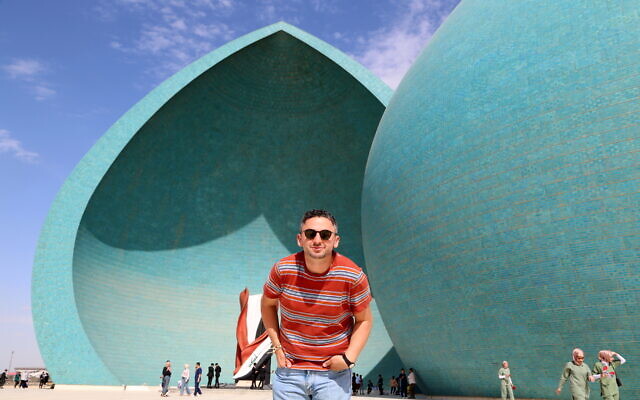
Herzberg flew to Bangladesh, starting on his venture of visiting every country in the world without yet realising what he was doing.
However, it was a pivotal moment in 2018 when someone reached out to him, recognising the potential for him to become one of the youngest individuals to achieve such a remarkable feat.
“I took a step back and thought, oh, wow, this is actually achievable,” Herzberg said.
From that point on, he set his sights on making this seemingly crazy dream his reality. Initially, he envisioned it as a lifelong endeavour, but around four or five years ago, he realised that he could make it happen within a more compressed timeframe.
The COVID-19 pandemic caused some delays but did not deter his determination and he completed his travel checklist in 2023.
While Herzberg’s quest to visit every country brought him incredible experiences, it was not without its fair share of logistical and personal challenges.
He faced a particular set of difficulties in approximately 50 countries, mainly situated in Western and Central Africa, where tourism infrastructure was virtually non-existent and the concept of a tourist visa was relatively unheard of.
“Most of these countries don’t have embassies in Australia or Western countries,” Herzberg explained.
Undeterred, he found a workaround by identifying regional hubs in East or West Africa, such as Kenya or Senegal, and then navigating the embassies of the more elusive countries from there.
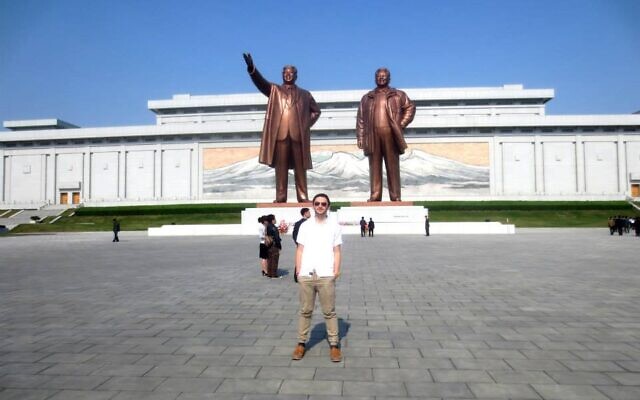
“It wasn’t a matter of simply applying for a visa,” he said, adding, “I would have to go to their embassy and sometimes visit three or four countries until I found an ambassador who would grant me the visa.”
Herzberg recalled the arduous process that involved extensive documentation, multiple meetings and several days spent visa shopping in various capitals. Despite the challenges, Herzberg had no choice but to keep trying or give up on his adventure and over the years, he managed to get into every last African country.
“Now that it’s over, I’m just not applying for a visa for at least a year. There was so much frustration, money and headaches involved,” Herzberg explained.
As a Jewish traveller, he also faced some unique challenges during his journey in that most of the time he “had to hide it”.
He told The AJN, “There’s a lot of challenges to being a Jewish traveller in the sense that often, I guess I found I was exposed to things that weren’t really comfortable.”
He encountered instances where age-old antisemitic tropes were casually thrown around in conversations, but as a guest in foreign countries, he felt he had to navigate these situations diplomatically and carefully.
Herzberg explained, “You just kind of have to sit there and smile and you don’t want to cause any trouble.”
As he delved deeper into regions like the Middle East and North Africa, he embarked on research into Jewish heritage, particularly in Iraq, Syria and Lebanon where he was seeking out former Jewish communities, synagogues and cemeteries.
However, gaining access to these sites was often a rigorous process and on one occasion in Egypt it took him “three months of applying for a permit to get access to synagogues”, he said.
Visiting these Jewish sites often involved permits and gatekeepers who perpetuated historically inaccurate and offensive narratives.
“You really have to just sort of nod with their narrative and often their narrative is just so … forget historically inaccurate, it’s just very offensive,” Herzberg shared, adding “and that’s hard to be around.”
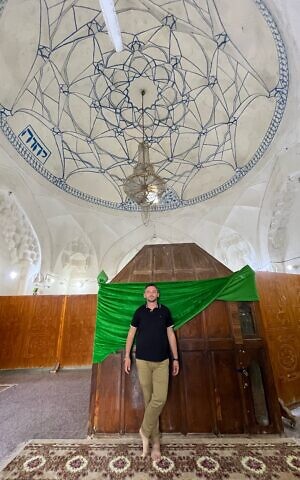
In some places, he encountered unsettling displays, such as in Baghdad where it was not uncommon to see photos of Hitler in shops, which often left him grappling with how to respond.
“There’s that subconscious element, which I think definitely, took its toll over time,” he explained.
During the COVID-19 pandemic, he spent four months in Cairo, where he encountered a multitude of situations that further heightened his awareness and understanding of the challenges faced by Jewish travellers and he found himself “exposed to a lot”.
“I got to a point where I was just sort of fed up with it,” he said.
In his quest to seek out Jewish stories and heritage, Herzberg actively engaged in conversations to understand different global Jewish perspectives.
He told The AJN that he wanted to hear “untold Jewish stories”.
Despite coming across narratives that were historically inaccurate, Herzberg found the politics of Jewish heritage and the way different groups spoke about it to be intriguing.
He recounted a conversation he had in Baghdad, where he was told that there are still thousands and thousands of Jews living in synagogues in the capital to that day, knowing well that the reality differed and there are only four synagogues left in the city.
He said, “That’s what they tell them in school and I think that’s really interesting.”
Herzberg said he feels privileged to witness and learn from these experiences. As he engaged in public speaking and community interactions, he said he found it rewarding to “meet people who grew up in Jewish communities in Lebanon, Iran or wherever” and individuals from these once vibrant but now largely empty Jewish communities.
He said it was rewarding “listening to their stories and bringing their heritage back to life”.
When asked about the privilege of being a male traveller, Herzberg acknowledged the differences and considerations involved.
He said, “It’s hard to put myself in someone else’s shoes,” despite being asked this question a lot. In conflict zones or war-torn countries, Herzberg relies on local contacts or trusted individuals who have connections with journalists or have assisted him in the past.
Saying that for a solo female traveller these circumstances “would be okay”.
He recognised that for women, there may be additional challenges but also some advantages.
In Muslim countries, for instance, he acknowledges that he can only access 50 per cent of the population and cannot converse freely with women in countries like Afghanistan or Yemen. However, he also recognised that “in a lot of countries, I also have the privilege of being able to walk around at night and not really worry when there’s no women on the streets at night.”
He said ,”I don’t think it’s impossible,” for a solo female traveller to take on the task of visiting every country in the world, however noted that “everyone’s got their different levels of what they’re comfortable with.”
On his journey, Herzberg himself had many experiences when he felt scared and unsafe.
For example, he travelled to Somalia for three days only because it was “just too dangerous to stay longer”.
He told The AJN, “In order to get the permissions to enter, you have to sort of sign up for a security convoy, so I had a blast-proof car and four armed guards with me the whole time.”
He explained that the hotels in Somalia “are in sort of a safe compound where you pass through about seven checkpoints,” however he shared that the hotel he stayed at was blown up a few months after his visit.
“In saying that, it’s still a beautiful country with a lot of colour and it’s still, you know, one of the hardest things to explain to people about war zones … life really does go on. There are still kids at the park, there’s still an ice cream shop and there are still people selling balloons,” he said. “As a traveller that is something really cool to experience.”
“You smell challah, you smell a bit of chicken soup, and you’re like, that’s it right?”
Herzberg also reflected on the comparison of Jewish communities around the world, highlighting both similarities and differences.
He noted that in countries such as the US, Canada, the UK and South Africa, the Jewish communities “feel very similar to Melbourne and Sydney”.
He also acknowledged the contrast between Diaspora communities that thrive and those in smaller countries of the world or Eastern Europe that are dwindling.
Herzberg said, “You feel like you’re sort of seeing a community on its lifeline.” Despite the variations, he emphasised the sense of community and belonging he experienced wherever he goes and the joy in being able to walk into a Jewish home anywhere in the world and instantly feel a connection and a sense of safety.
The familiar smells and traditions of Shabbat dinner made him feel at home, even when he was so far away from it.
He said, “You smell challah, you smell a bit of chicken soup, and you’re like, that’s it right?”
The final country on Herzberg’s incredible journey was Tonga.
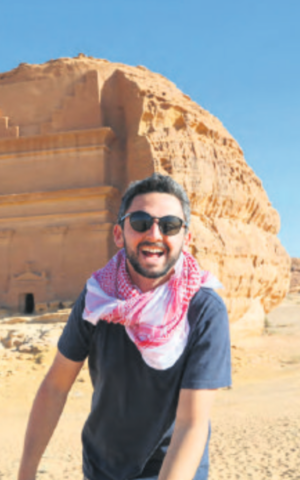
To celebrate this milestone, his family joined him on the Polynesian island and they had “a little bit of a party”.
“It was more than anything just lovely to be able to reminisce and take a moment to just go, oh wow, I really got through it,” he said.
His parents, who at times were home in Melbourne worrying and wondering in what dangerous place their son might be that day, joined him in his celebrations and stayed supportive throughout the journey.
“There were a lot of challenges, a lot of moments where I did not think I was going to get out of that country, let alone finish,” he shared.
“There was certainly, as you can imagine, some real highs and epic lows.”

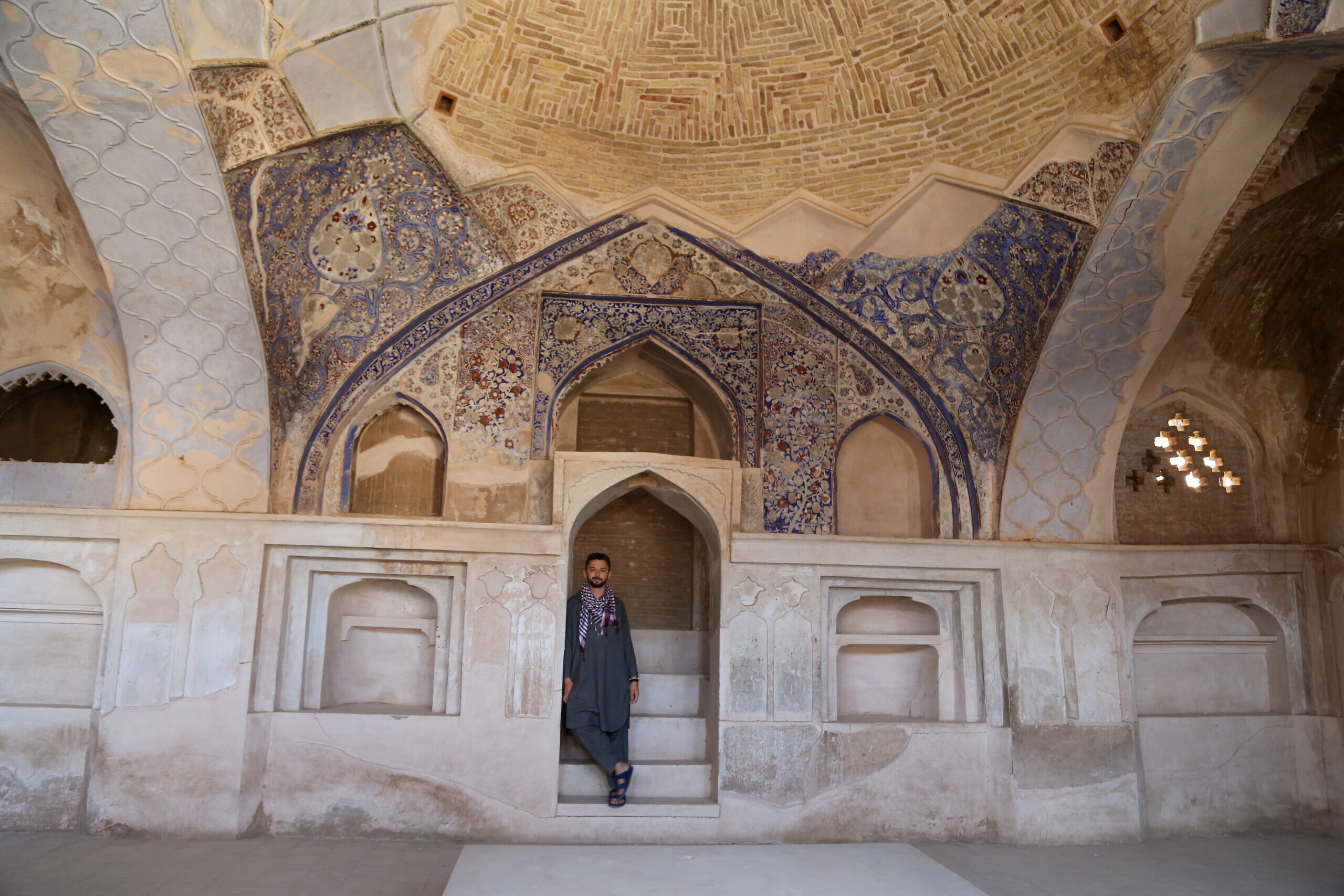
comments